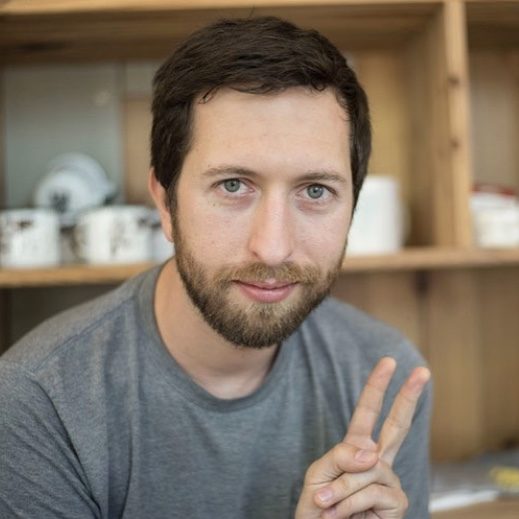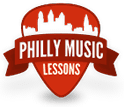
Banjo, Guitar & Bass
Tyler Bussey
He/ Him/ His
B.A., English University of Connecticut
Rock, Pop, Folk & Contemporary
I teach Banjo, Guitar, Bass Guitar. I primarily play the guitar, and also play the five-string banjo and bass guitar, among other instruments. I am well-versed in a variety of styles and techniques in addition to possessing a strong background in music theory. I’ve toured internationally and released records with bands that have been praised by Pitchfork, Noisey, and many other outlets and publications. I have a BA in English from the University of Connecticut.
When did you begin playing Guitar, and why?:
I started playing the guitar when I was 12. Like a lot of young people, I think music didn’t really seem accessible, or even all that fun, until I started listening to punk rock. I took piano lessons as a kid and studied instruments in school, but it didn’t stick and didn’t feel like me; it took something like guitar, a portable instrument you could play with your hands, sitting or standing, acoustic or amplified, clean or distorted, and you could sing or yell if you wanted. (And it looked cool!) Guitar just felt inherently exciting and not intimidating to me as a kid, especially electric guitar, and I felt like I could figure it out on my own or forge my own path.
What other instruments do you play, and what is your experience with them?:
I can sort of fake it on a number of instruments, especially fretted, stringed instruments. I will sometimes play the keyboard or synthesizer, although nothing crazy. The five-string banjo, more than anything else, is something I’ve attempted to really get inside of technique-wise. A lot of guitar players will play the bass like a guitar, or the banjo like a guitar, rather than learning the specific idiomatic topography of the instrument—I feel like you can usually tell when a guitarist who doesn’t really play the banjo or bass or mandolin or whatever is faking it!—and that’s something I really wanted to avoid when I was getting into banjo. Studying the clawhammer technique, as well as learning different old-time tunes and tunings and making my own, has really helped me grow in many ways as a musician!
What are your personal goals as a musician?:
Creative expression and collaboration, ultimately. I’ve never been terribly interested in being a virtuoso shredder or whatever; most of my favorite musicians aren’t, either. I’m more interested in learning from a wide variety of different approaches, and being able to play or create in a variety of contexts. I love to perform and make records and I’ve always been more interested in songwriting than just learning other people’s songs and tricks, although that has also been an invaluable thing, especially when it comes to traditional styles with deep histories and songbooks—studying folk music or learning a jazz standard, for instance. I’m especially interested lately in using effects to manipulate the guitar into interesting colors or timbres you wouldn’t necessarily associate with guitar, just sort of figuring out ways to make music and music-making feel fresh and exciting.
Do you have a memory of a time when a musical concept or technique really clicked? Something you’ll remember forever?:
I took lessons from when I was 12 until I turned 18, and my teacher really tried to get me to learn theory. A lot of it went over my head or didn’t register. I vividly remember, in the year after ending my lessons with him (when I left home to go off to college) that I bought a theory book and started studying on my own, and suddenly the concept of enharmonic equivalents just *clicked*; it felt like I could finally understand and communicate ideas about things like keys, scales, and harmony that had previously just felt too advanced. Also, I briefly studied bluegrass online with Brian Sutton and I remember being taught about the rest-stroke flat picking technique and feeling like, “Why didn’t I learn this years ago!!” That’s a small, but integral building-block to good technique. Huge game changer.
What is your favorite piece of advice from one of your past (or current) teachers?:
Typically, the thing I keep coming back to that teachers have instilled in me is to think not only about what you’re practicing, but how you’re practicing it. It usually comes down to being patient, and doing your best to be disciplined in taking it slow; it’s better to work slowly and methodically on a bar or measure of music that gives you trouble, until you get it, than to try to conquer huge problems all at once without breaking them down into manageable chunks.
What was your most challenging moment learning an instrument?:
A weird, but cool, thing about how I learned the guitar is that my teacher really focused on teaching me the entire fretboard, and closed voicings—I learned a lot of scales and jazz chords and that sort of thing, even though I didn’t really know the theory behind them yet, and wasn’t really learning open chords or playing melodies utilizing the open strings of the guitar. It wasn’t until college that I started to get into folk music or other styles that really rely on open strings. It’s been interesting trying to develop a cohesive style or fluency in multiple ways of playing the guitar, like using a pick versus fingerpicking or hybrid picking, that sort of thing. And learning how to play clawhammer banjo in college was really tough, especially because I didn’t own a banjo! I would borrow one from a friend and just try to figure it out for days on end until it finally started to sink in.
What is your biggest musical achievement?:
I’ve been very fortunate and been afforded a lot of amazing opportunities. Touring Europe and the UK twice, and the U.S. several times, has been amazing; getting to play sold-out shows at amazing venues like Irving Plaza or Music Hall of Williamsburg has been a tremendous honor and privilege, and I’ve shared the stage with some amazingly talented people. Playing in Brazil was an especially mind-boggling thing. But something I always try to remember, and to tell other musicians, is that sometimes the biggest moments, the ones you’ll cherish the most, aren’t the biggest shows or the most popular things you’ve done, they’re just the ones you’re most proud of. I’ve played shows to five or ten people that felt, musically, like the coolest thing I’ve ever done, and the challenge is to keep going and keep pushing and trying to top yourself. I hope my biggest musical achievement is yet to come!
Favorite thing about teaching?:
It is so cool to watch someone finally get something they’ve been trying to understand or to finally nail playing a part they’ve been struggling with, and more than anything it’s thrilling to give someone a foundation they can use that will make all their future music-making clearer, easier, more intentional. It’s the whole “teach someone to fish” approach: you want to help someone feel like they’re becoming a more musical person, or someone who can access their musicality more easily because they understand it better.
What is a piece of advice you would like to share with anyone learning music?:
I think it’s really about listening, more than anything! Cultivating a relationship with music that is about being curious, and interested, and about sharing, is a special thing. Ultimately, music is a thing people use to express themselves, so when you’re hearing beautiful music you’re hearing another person, or people, speaking to you, and that’s an amazing thing that we can lose sight of sometimes. Studying music can, and should, teach you a lot about yourself and about other people, and can make you a better person in more ways than just being able to shred a Black Sabbath solo or something.
Personal music projects:
Old stuff that’s worth checking out is a band I used to play in called The World Is a Beautiful Place & I Am No Longer Afraid to Die (I know, ridiculous name). Kind of a post-rock meets emo meets indie rock amalgam. I played on two albums, Harmlessness and Always Foreign, both out on Epitaph. I currently play in a band based in Philly called Strange Ranger, and I am going to release some music I’ve been working on soon as a band called Thank You Thank You (or tyty).
